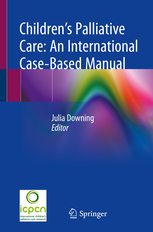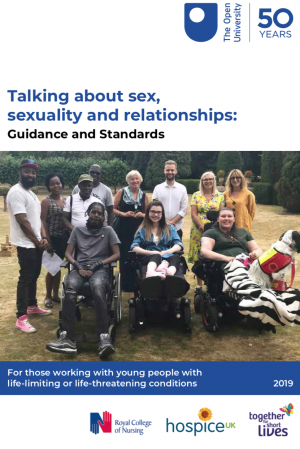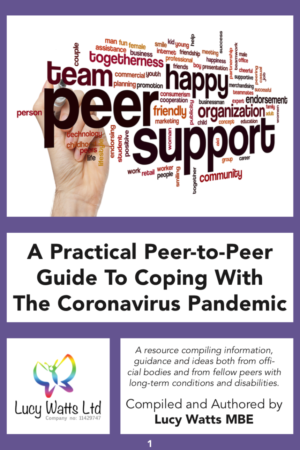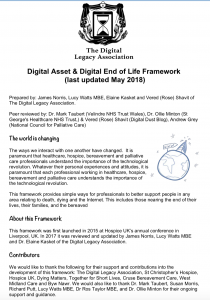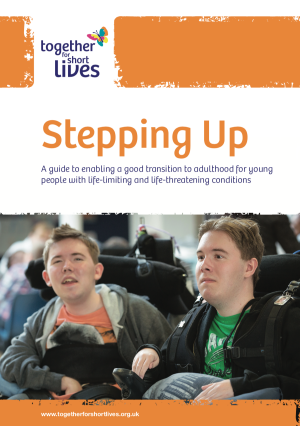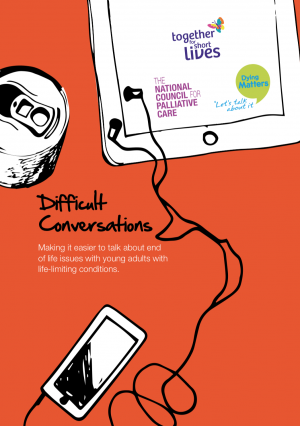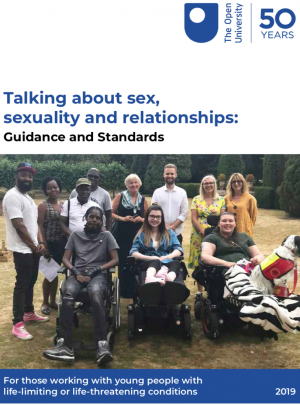Publications
On This Page….
- Journal Articles, Posters, Abstracts
- Guidance, Reports, Resources
- Resource Forewords
- Books, Chapters, Forewords
- Blogs and Articles
- Other
Watts, L, Rodriguez, A, Tatterton, M et al. (2019) Meaning making and Generativity in Children and Young people with Life limiting conditions (MAGICYL). Evidence-Based Nursing, 22 (2). pp. 33-35. ISSN 1367-6539
DOI: https://doi.org/10.1136/ebnurs-2019-103075
Whitney, S., Liddiard, K., Goodley, D., Runswick-Cole, K., Vogelmann, E., Evans, K., Watts (MBE), L., and Aimes, C. (2019) ‘Working the edges of Posthuman disability studies: Theorising with young disabled people with life-limiting impairments’, Sociology of Health and Illness, Early View
Liddiard, K., Runswick-Cole, K, Goodley, D., Whitney, S., Vogelmann, E. and Watts, L. (2018) ‘“I was excited by the idea of a project that focuses on those unasked questions”: Co-Producing Disability Research with Disabled Young People‘, Children and Society, 33: 2, 154-167
Watts, L., Samuels, H., Jackson, Kate., Morris, Claire., (2018), ‘Building a Global Movement of Direct Stakeholders as Advocates for Palliative Care’, Journal of Pain and Symptom Management, vol. 56, no. 6, pp. e39.,
DOI: https://doi.org/10.1016/j.jpainsymman.2018.10.046
Watts, L. (2018) ‘Stepping up to adult services’, BMJ 2018;362:k3886
DOI: https://doi.org/10.1136/bmj.k3886
Last Updated: 09.01.2021
Children’s Palliative Care: An International Case-Based Manual
Lucy co-authored a chapter in this book, with Julia Downing, Marianne Phillips and Lizzie Chambers.
The chapter is titled Supporting the adolescent and young adult (chapter 19) and the chapter focuses on palliative care for adolescent and young adults (AYA) and transition to adulthood in palliative and end of life care. It talks about the needs of this emerging population and the need to be treated as individuals and to tailor their care to their age and developmental/intellectual ability, the fact that they often experience a high symptom burden, the need to treat the young adults as adults and not to infantilise them, to manage their emerging social, emotional, relational and sexual needs, the importance of them being able to ‘live life to the full’ and about transition from children-focussed to adult-oriented services and how this is managed.
The manual overall was created and edited by Professor Julia Downing of the International Children’s Palliative Care Network (ICPCN) and the manual is endorsed by ICPCN.
Click here to go to the Springer website where you can order a copy.
This manual enables individuals working in children’s palliative care (CPC) globally to learn through engaging real-world cases. The aim is to provide a clinical case-based resource that is globally relevant and accessible to those working in CPC. Drawing on case histories from around the world that reflect key issues and elements of CPC, it provides a practical approach grounded in experience. It addresses multidisciplinary care in the management of children and their families; discusses cases from an international perspective, and shares examples from a variety of countries, utilising cases across a range of ages and conditions, demonstrating holistic care. It represents the first case-based manual on global CPC and is endorsed and promoted by the International Children’s Palliative Care Network (ICPCN).
Children’s palliative care is a rapidly developing field, both in the UK and internationally. The provision of CPC varies considerably, with provision often being insufficient, and over 65% of countries having no recognised CPC service provision whatsoever. As such, while there are an estimated 21.6 million children who require palliative care, in many areas of the world, CPC is poor or non-existent, and children are treated like little adults without their distinctive needs being recognised or understood. There is also a dearth of literature on CPC, hence this clinical case-based manual fills a gap in the market, and is aimed at a global audience, making it a unique text in the field.
Watts, L., et al. (2020). ‘Supporting the Adolescent and Young Adult’ in Downing, J (ed.) Children’s Palliative Care: An International Case-Based Manual. Switzerland: Springer, pp. 223-234. DOI: https://doi.org/10.1007/978-3-030-27375-0
All The Ghosts In The Machine
Lucy appears in Elaine Kasket’s book All The Ghosts In The Machine talking about her digital legacy and how she relies on digital technology and social media to live, to socialise and to work.
Click here to go to Amazon where you can order a copy.

Courage is Compulsory
Lucy authored the foreword to “Courage is Compulsory”, a book that shares the stories of three young adults with life-limiting conditions, Tori, Sam and Laura, who are achieving remarkable things in their lives.
Launched in 2015 by DJ Southgate Publishers, the book sought to show the remarkable achievements against the odd by young people with life-limiting conditions and the incredible lives they lead. It sought to inspire other people, especially young disabled people, that there is still so much life left to live, and that you can do anything you set your heart to if you work hard enough.
Sadly no longer available to purchase.
Last Updated: 05.04.2020
Talking about sex, sexuality and relationships: Guidance and Standards
Third edition
Principle authors:
Maddie Blackburn, Lizzie Chambers, Alison Cooke, Sarah Earle, Claire de Than and Lucy Watts
With particular thanks to: Members of The AdversiTeam and The Open University Sexuality Alliance
Legal Advisors:
Claire de Than and David Raeburn
Click here to access the guidance.
“This third edition of Talking about Sex, Sexuality and Relationships aims to provide key standards for health, social care and education staff working with young people who have life-limiting or life-threatening conditions (LLTCs). It provides information about how best to support young people, and their families, in addressing sexuality, sexuality expression, relationships and intimacy, providing signposts to useful resources and examples of the law applied to practice. It is not a comprehensive ‘how to’ guide covering every aspect of sex, intimacy and relationships but aims to highlight some of the key issues that may arise…
It also sets out some of the key governance issues that need to be considered by organisations and service managers.
The guidance is not setting-specific, but has been designed for use by statutory and voluntary sector agencies, independent organisations as well as professionals who are employed through direct payments in the UK. The guidance may also be useful for parents, carers and partners.”
A Practical Peer-to-Peer Guide To Coping With The Coronavirus Pandemic
I have produced this practical peer-to-peer resource around COVID-19, to help people with ongoing health needs and/or disabilities, and their families and carers, to know how to manage the situation, share information, keep themselves safe and put plans in place. It shares government information about isolation and shielding, has information around infection control including correct hand-washing technique and suggestions for maintaining hygiene and a clean environment, personal protective equipment, all about care packages, contingency planning, keeping yourself safe, forward planning, and advance care planning around wishes for life and end of life.
It is not an all-encompassing resource and should not be read as an official document or manual, but enables information to be shared in a way that makes sense to people, in one place, giving ideas and tips for managing, sharing information including government information and clinical information around hand-washing and infection control, as well as other information and advice.
Click here to access the resource.
Digital Asset & Digital End of Life Framework
Prepared by: James Norris, Lucy Watts MBE, Elaine Kasket and Vered (Rose) Shavit of The Digital Legacy Association.
Peer reviewed by: Dr. Mark Taubert (Velindre NHS Trust Wales), Dr. Ollie Minton (St George’s Healthcare NHS Trust,) & Vered (Rose) Shavit (Digital Dust Blog), Andrew Grey (National Council for Palliative Care)
Click here to access the framework.
(the framework was last updated May 2018)
Last Updated: 05.04.2020
Stepping Up
A guide to enabling a good transition to adulthood for young people with life-limiting and life-threatening conditions
By: Together for Short Lives
Stepping Up aims to provide a generic framework that can be adapted locally to plan multi-agency services for young people with life-limiting or life- threatening health conditions as they become adults and move into adult service provision. Multi-agency working involves services in the statutory sector, voluntary sector agencies and independent providers, as well as those employed directly by the young person and their family through direct payments.
Click here to access the resource.
Difficult Conversations for Young Adults
By Together for Short Lives, the National Council for Palliative Care (now Hospice UK) and Dying Matters.
Difficult Conversations for Young Adults, funded by Roald Dahl’s Marvellous Children’s Charity, was developed following conversations with 13 young adults with a life-limiting condition and families who have cared for a young person in the past. The resource has been created to support health professionals in having difficult conversations with the growing number of children and young adults with life-limiting conditions who come into their care.
Although the overwhelming message from the young adults and families in this guide was ‘we want to focus on living, not dying’, they also recognised that there are times when it is not only necessary, but helpful to talk about issues to do with dying. Having an honest conversation about wishes for future care and how young adults wish to be remembered, can bring peace of mind to both them and their family.
Click here to access the resource.
Talking about sex, sexuality and relationships: Guidance and Standards
Lucy co-authored the foreword to both the first and second editions of the Guidance with Junior (Hameed Jimoh), and authored individually the foreword for the third edition of the guidance.
“This third edition of Talking about Sex, Sexuality and Relationships aims to provide key standards for health, social care and education staff working with young people who have life-limiting or life-threatening conditions (LLTCs). It provides information about how best to support young people, and their families, in addressing sexuality, sexuality expression, relationships and intimacy, providing signposts to useful resources and examples of the law applied to practice. It is not a comprehensive ‘how to’ guide covering every aspect of sex, intimacy and relationships but aims to highlight some of the key issues that may arise…
It also sets out some of the key governance issues that need to be considered by organisations and service managers.
The guidance is not setting-specific, but has been designed for use by statutory and voluntary sector agencies, independent organisations as well as professionals who are employed through direct payments in the UK. The guidance may also be useful for parents, carers and partners.”
The recently launched third edition can be accessed by clicking here.
You can also access the first edition (click here) and second edition (click here).

